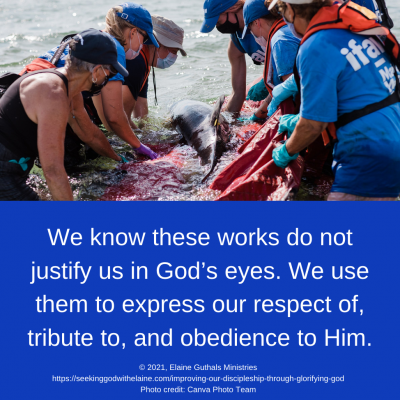God created us. He sustains us and provides for us. But what duties do we have in turn? This daily devotional looks at what glorifying God means and how we are to accomplish that.
Nuggets
- Our entire life should be focused on glorifying God through living morally.
- We glorify God by the good works performed through His righteousness in us.
- We glorify God when we have a clear moral conscience.
To read devotions in the Redo for Godliness series, click the appropriate button below.
Devotions in the Moralities Lead to Godliness series

We started looking into how Manton began to tie up his sermon entitled The Moralities of Christianity. We looked at morality enforced through sanctification; principles; and right and wrong.
In this devotion, we will look at how we are to give glory to God. Remember, we will leave the connections and the application to whenever all the topics have been discussed. So, endings might be a little abrupt.
Resources
Let's Put It into Context #1
“Finally brothers and sisters, whatever is true, whatever is honorable, whatever is just, whatever is pure, whatever is lovely, whatever is commendable — if there is any moral excellence and if there is anything praiseworthy — dwell on these things” (Phil. 4: 8 CSB)
The definition of moral, according to the Merriam-Webster Dictionary, is “of or relating to principles of right and wrong in behavior.” Morality, then, is “a doctrine or system of moral conduct.” When it is the plural form — moralities — it is a “particular moral principles or rules of conduct.”
Resources
Our morals determine our character. Character, according to the Merriam-Webster Dictionary, is “the complex of mental and ethical traits marking and often individualizing a person, group, or nation.”
Resource
Binning wrote glorifying God “… is in our souls to conceive of Him, and meditate on His name, till they receive the impression and stamp of all the letters of His glorious name, and then to express this in our words and actions, in commending of Him, and obeying of Him.”
Resource
Let's Put It into Context #2
Nuggets from the last two devotions:
- Our morality increases from the sanctification process.
- Our morality is a reflection of our faith.
- Our morality is our faith expressed through love.
- Our morality is contingent on the grace of God.
- In God’s Word, good is always right and evil is always wrong, so to be morally correct, we need to repay evil with good.
- We may need to redefine Matthew 25: 31-46.
- We need to choose what is right and good in order to combat evil.
- We need to rule our passions.
Morality Enforced through Glorying God
“So, whether you eat or drink, or whatever you do, do everything for the glory of God” (I Cor. 10: 31 CSB)
Our entire life should be focused on glorifying God through living morally.
Paul began this discussion by giving instructions on what to do about knowingly eating meat sacrificed to idols. He brought up some very good points.
- “You cannot drink the cup of the Lord and the cup of demons. You cannot partake of the table of the Lord and the table of demons” (I Cor. 10: 21 ESV).
- “‘All things are lawful,’ but not all things are helpful” (I Cor. 10: 23 ESV).
- “Give no offense to Jews or to Greeks or to the church of God, just as I try to please everyone in everything I do, not seeking my own advantage, but that of many, that they may be saved” (I Cor. 10: 32-33 ESV).
Hmmm. Sounds kind of contradictory??? Not really.
The foundation is God wants us to be His children, not Satan’s. There are do’s and don’ts that we are expected to follow. There are also some things that are a do, but in some cases would wreck our witness.
The bottom line is our motivation. Are we choosing to follow God or not? Are we submitting to Him, or are we making choices solely on building ourselves up?
We need to make the choices that bring glory to God.

If salvation was only awarded based on our actions, our goose would be cooked. We struggle with doing it the right thing. We also struggle with consistency issues.
But doesn’t this passage promote consistency issues? What may be offensive to one person — therefore, making it a sin — isn’t to someone else — so it isn’t a sin. What gives?
Venn believed that worldview people “… can scarcely understand the application of [the Christian principle].” He argued that worldview people just see the ceremony of religion rather than the relationship for which God is actually striving. They see morality as a man-to-man exercise, not a man-to-God exercise.
Case in point. When we cheerfully go about our lives, we are bringing glory to God. When we work hard to serve Him in what we are supposed to do, we are bringing glory to God. Binning summed it up by saying our being and doing should be to glorify God.
Resource
I see Paul telling us a couple of things here. Nothing is too small or too large that it can’t be used to glorify God. We are to see God’s hand in every aspect of our lives. Pearson wrote, “It is that daily work brings out the Christian temper, shows the Christian character and develops it.
Resource
We don’t have to keep finding the next best thing to glorify Him. He wants to be glorified in our everyday, common lives.
When we glorify God through our being and our doing, we are making a big statement that He is worthy of our praise.

“filled with the fruit of righteousness that comes through Jesus Christ to the glory and praise of God” (Phil. 1: 11 CSB)
We glorify God by the good works performed through His righteousness in us.
We’ve talked about the fruits of righteousness before. We talked about them being the rewards of a godly life.
To read a related devotion, click the button below.
Airay had a different take. He felt they were the good works we do that came from our being righteous as God is. Good works means that we give God our best to complete whatever tasks He assigns for us to do. We think of good works as activities we do.
Resource
We know we are called to do good works. “For we are his workmanship, created in Christ Jesus for good works, which God prepared ahead of time for us to do” (Eph. 2: 10 CSB).
We know these works do not justify us in God’s eyes. We use them to express our respect of, tribute to, and obedience to Him.

“But I admit this to you: I worship the God of my ancestors according to the Way, which they call a sect, believing everything that is in accordance with the law and written in the prophets. I have a hope in God, which these men themselves also accept, that there will be a resurrection, both of the righteous and the unrighteous. I always strive to have a clear conscience toward God and men” (Ac. 24: 14-16 CSB)
We glorify God when we have a clear moral conscience.
Hmmmm. I wonder why Manton used these verses to talk about glorifying God? Paul was brought before Felix, and he had just started his defense.
Of course, that defense started out with a declaration of what Paul believed.
- Paul believed in the God of his ancestors.
- What he believed is what other would consider, if they were being nice, an offshoot of that.
- He believed in the hope of the resurrection.
- He tried to live for God so that he could have a clear conscience.
Maybe Manton was focusing on the conscience again. In this version, it is translated clear conscience. The King James Version translated it as “… a conscience void to offence (sic) …” (Ac. 24: 16 KJV).
Well, First Corinthians 10: 32 talked about not causing offense. We’ll go with that.
Niven felt that our consciences attest to the quality of our actions. That validated the need for us to be knowledgeable with God’s code of morals.
But Niven said that it was a two-step process in attesting to the quality of God’s moral code.
- We needed to affirm that God’s law was pure.
- We needed to confess we are far from pure.
Resource
We only know that through the promptings of the Holy Spirit. It is only through the calling of God do we come to Him. Fortunately, He calls everyone to salvation; unfortunately, not everyone accepts the gift.
Hannam presented a couple of reasons why we do not possess a clear conscience. Some are too caught up in the worldview to determine their needs of a Savior. Others just don’t see the need. Unfortunately, others refuse, resting on their flawed morals.
Resource
A clear conscience can only come from fulfilling our duties as children of God. Those duties are to “‘… love the Lord your God with all your heart and with all your soul and with all your mind and with all your strength.’ The second is this: ‘You shall love your neighbor as yourself’ …” (Mk. 12: 30-31 ESV).
Using the greatest commandments as the bow, we tie together God’s rules and our actions. That sweeps the conscience.
Glossary
Hodge gave us a little more insight on what the conscience is. He wrote, “Conscience, therefore, is not a single faculty. It is a collective term for those exercises of our rational nature which concern moral good and evil. It includes cognition and judgment of approbation and disapprobation. And it is an impulse, as desires and affections are. It is not a mere decision as to truth.”
Resource
I read that to say that the decision is still ours. We can follow our conscience’s direction to be a moral person or we can choose not to.
There were some interesting takes.
- Vaughan called the conscience “a moral memory.”
- Hodge said it contained “the perception of moral distinctions” and “a sense of moral obligation.”
Resource
Being a memory ties the conscience to our past. I would see it being formed by our past experiences and past knowledge. It is shaped by the morals to which we have ascribed in the past.
But notice Paul said that he “… always strive[s] to have a clear conscience toward God and men” (Ac. 24: 14-16 CSB). That tells us our conscience can change in two ways.
- It is not stagnant. It can change.
- Since it can change, it can grow to be more godly.
I don’t know about you, but my brain is spinning. This really went no where near where I thought it would go when I looked at Manton’s topic.
My take is that God knows that we will have work to do after conversion. Even if we are what the worldview considers a moral person, we have to align our morals with Him.
That is the whole purpose of the Sanctification Road. We get to change and grow to be like Him. That is the best way to bring Him glory and honor.
Father God. It is our desire to bring You glory and honor. We want to live lives that show Your hand at work in us. May we always show Your moral compass. Amen.

What do you think?
Leave me a comment below (about this or anything else) or head over to my Facebook group for some interactive discussion.
If you don’t understand something and would like further clarification, please contact me.
If you have not signed up for the email daily or weekly providing the link to the devotions and the newsletter, do so below.
If God has used this devotion to speak with you, consider sharing it on social media.
Pingback: The Foundation for the Fruits of the Spirit – Seeking God with Elaine